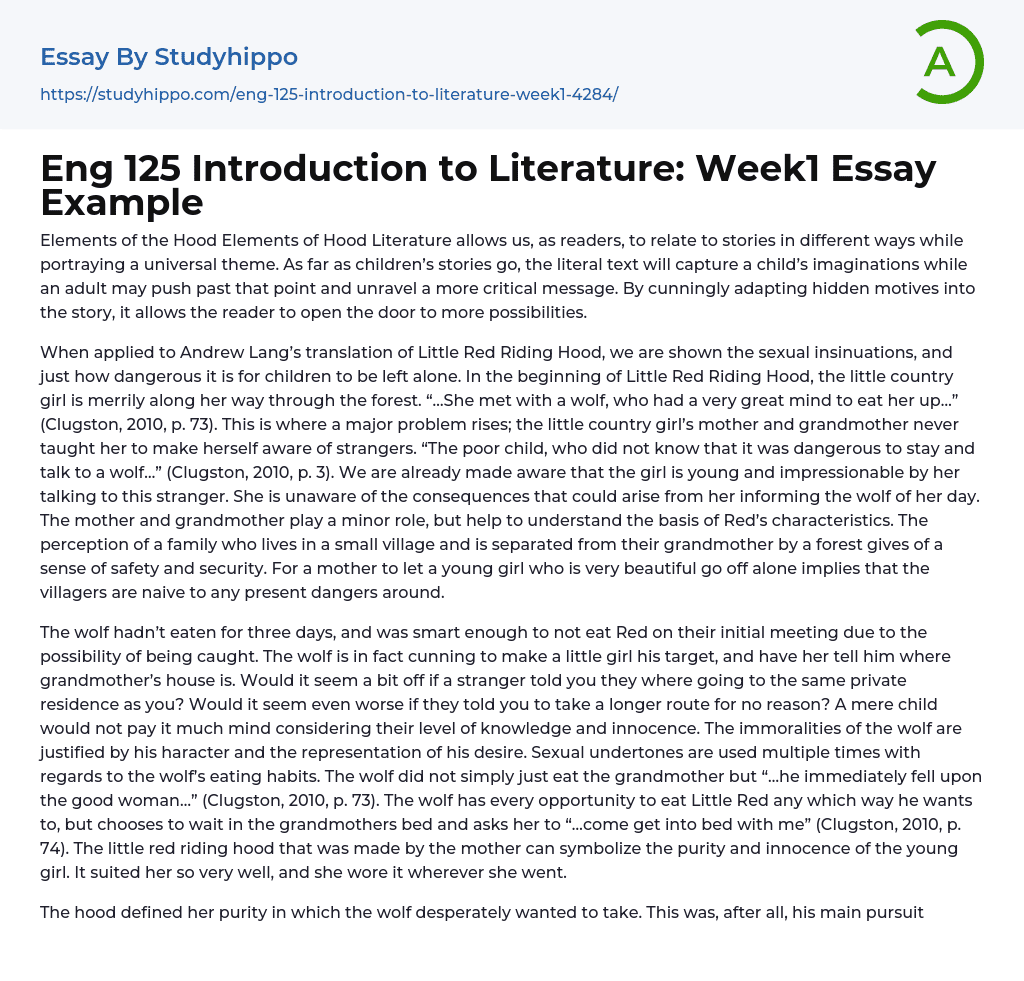The Elements of Hood Literature enable readers to experience stories in various ways, while still conveying a universal theme. For children, the literal text ignites their imagination, whereas adults can probe deeper and uncover a more profound message. Through cleverly incorporating hidden motives into the narrative, readers are encouraged to explore different potentials and interpretations.
Andrew Lang's translation of Little Red Riding Hood reveals the presence of sexual implications and emphasizes the potential danger children face when left unsupervised. The story begins with a young girl joyfully walking through the forest, but she soon encounters a wolf who openly expresses his desire to devour her (Clugston, 2010, p. 73). This situation highlights the problem that arises when a child has not been taught how to recognize and be cautious around unfamiliar individua
...ls by her mother and grandmother.
“The poor child, who did not know that it was dangerous to stay and talk to a wolf…” (Clugston, 2010, p. 3). The young girl's innocence is revealed as she engages in a conversation with a stranger without realizing the potential risks involved. Unaware of the possible consequences, she freely shares details about her day with the wolf. Although the mother and grandmother have smaller roles, they contribute to our comprehension of Red's personality traits.
The perception of a family living in a small village and separated from their grandmother by a forest evokes a sense of safety and security. It implies that the villagers are naive to any dangers present, as a mother allows her young, beautiful daughter to go off alone. The wolf, having not eaten for three days, cleverly refrains from eating Red during their initial meeting t
avoid being caught. By targeting a little girl and having her reveal the location of her grandmother's house, the wolf exhibits its cunning nature. Would it not seem strange if a stranger told you they were going to the same private residence as you? Would it not be even more suspicious if they instructed you to take a longer route for no apparent reason? A mere child would not think much of it given their limited knowledge and innocence.
The wolf's immoralities are justified based on his character and the representation of his desire. Sexual undertones are used repeatedly in reference to the wolf's eating habits. The wolf not only ate the grandmother, but "immediately fell upon the good woman" (Clugston, 2010, p. 73). Although the wolf had the chance to eat Little Red however he pleased, he decides to wait in the grandmother's bed and requests her to "come get into bed with me" (Clugston, 2010, p.).
The mother made a little red riding hood for the young girl, symbolizing her purity and innocence. The hood suited the young girl and she wore it always. It represented her purity that the wolf desired. This was his main goal throughout the story. After tricking the young girl, she took off her clothes and got into bed, as the wolf had instructed (Clugston, 2010, p.).
According to Clugston (2010, p. 74), the wicked wolf attacked Little Red Riding Hood and devoured her entirely, mentioning the wolf's large body parts.
Ultimately, the wolf fulfilled his desires for a meal and sexual satisfaction, while Little Red Riding Hood's family symbolizes goodness. The wolf represents evil and deceit. It cannot be
justified that the young girl should bear the burden of her grandmother's and her own ill fate since she was unaware of any wrongdoing. The author explicitly states that Red's mother and grandmother deeply love her but failed to educate her about the dangers and wickedness of the world. Regardless of interpretation, the theme remains clear: refrain from talking to strangers and avoid venturing out alone.
References
- Clugston, R. W. (2010). Journey into literature. San Diego, California: Bridgepoint Running Header;
- Book Summary essays
- Metaphor essays
- Reader essays
- Rhyme essays
- Literary devices essays
- Villain essays
- Books essays
- Genre essays
- Literary Criticism essays
- Writer essays
- Protagonist essays
- Simile essays
- Poem essays
- Book Report essays
- Book Review essays
- Greek Mythology essays
- Plot essays
- Tragic Hero essays
- Coming of Age essays
- Play essays
- Rhetoric essays
- Rhetorical Question essays
- Translation essays
- Understanding essays
- Reason essays
- Character essays
- Letter essays
- American Literature essays
- Literature Review essays
- Utopia essays
- Poetry Analysis essays
- Dante's Inferno essays
- Between The World and Me essays
- Incidents in The Life of a Slave Girl essays
- Flowers for Algernon essays
- Myth essays
- Everyday Use essays
- Boo Radley essays
- Genesis essays
- Richard iii essays
- Alice in Wonderland essays
- On the road essays
- Ozymandias essays
- The Nightingale essays
- Holden Caulfield essays
- Animal Farm essays
- 1984 essays
- A Hanging essays
- Shooting An Elephant essays
- A Tale Of Two Cities essays




